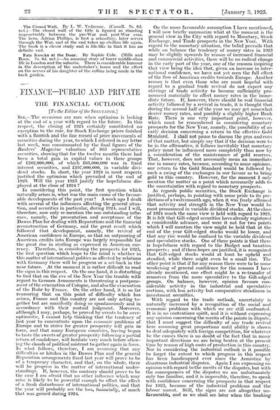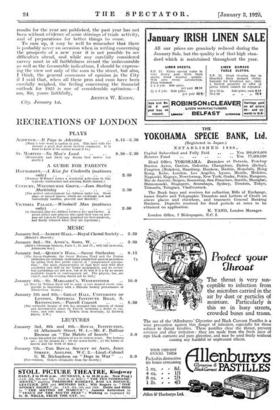FINA_NCE - PUBLIC AND PRIVATE
THE FINANCIAL OUTLOOK
[To the Editor of the SPECTATOR.]
•
SIR,—The occasions are rare when optimism is lacking at the end of a year with regard to the future. In this respect, the closing of 1924 certainly constituted no exception to the rule, for Stock Exchange prices finished with a flourish and the fine record of price movements of securities during the year, to which I referred in my letter last week, was consummated by the final figures of the .Bankers' Magazine valuation of 865 representative securities, showing that for the twelve months there had been a total gain in capital values in these groups of £262,000,000, of which £65,000,000 was in fixed 'interest securities, and 119'7,000,000, in variable divi- dend stocks. In short, the year 1924 in most respects justified the optimism which prevailed at the end of ;1923. Will the year 1925 justify the hopefulness dis- played at the close of 1924 ? In considering this point, the first question which naturally arises is, what was the main cause of the favour- able developments of the past year ? A week ago I dealt with several of the influences affecting the general situa- tion, and securities in particular, during 1924, and I will, therefore, now only re-mention the one outstanding influ- ,ence, namely, the presentation and acceptance of the :Dawes Plan for dealing with Reparations'and the financial :reconstruction of Germany, and the great result which 'followed that development, namely, the revival of ,American confidence in Europe, so that an outpouring of American credits into Europe was largely responsible for the great rise in sterling as expressed in American cur- rency. Therefore, in considering the prospects for 1925, the first question which leaps to the mind is whether in this matter of international politics as affected by relations with Germany there will be progress or a set-back in the near future. At the moment it is rather difficult to read the signs in this respect. On the one hand, it is disturbing to find that on the eve of the New Year the trouble with regard to German Armaments is threatening a postpone- ment of the evacuation of Cologne, and also the evacuation of the Ruhr by France. On the other hand, it is so far reassuring that on this point of difficulty which has arisen, France and this country are not only acting to- gether but are manifestly doing so spontaneously and in accordance with their mutual judgment. Moreover, although I may, perhaps, be proved by events to be over- optimistic, I cannot help thinking that the tendency of last year to concentrate upon the economic problems of Europe and to strive for greater prosperity will gain in force, and that many European countries, having begun 'to taste the sweets of greater prosperity following a partial return of confidence, will hesitate very much before allow- ing the clouds of political mistrust to gather again in force. In what follows, therefore, I am assuming that any difficulties or hitches in the Dawes Plan and the general Reparation arrangements fixed list year will prove to be of a temporary character, and that, on the whole, there will be progress- in the matter of international under- standings. If, however, the contrary should prove to be the case I am afraid that no other influence which may arise is likely to be. powerful enough to offset the effect of a fresh disturbance of international polities, and that the year will probably see the loss, financially, of much that was gained during 1924. On the more favourable assumption I have mentioned, I will now briefly summarize what at the moment is the general view in the City with regard to Monetary, Stock Exchange, and Trade prospects in the New Year. With regard to the monetary situation, the belief prevails that while on balance the tendency of money rates in 1925 may be slightly upwards by reason of increased financial and commercial activities, there will be no radical change in the early part of the year, one of the reasons inspiring that view being the idea that, given an increase in inter- national confidence, we have not yet seen the full effect of the flow of American credits towards Europe. Another reason is that even those who are most hopeful with regard to a gradual trade revival do not expect any stirrings of trade activity to become sufficiently pro- nounced materially to affect money rates in the imme- diate future. If, however, there should be real- financial activity followed by a revival in trade, it is thought that during the second half of the year we may get somewhat dearer money rates, and possibly a slightly higher Bank Rate. There is one very important point, however, which must be remembered in considering monetary prospects for the New Year, namely, the possibility of an early decision concerning a return to the effective Gold Standard. I shall not pause to discuss the pros and cons of that matter, but simply say that if the decision were to be in the affirmative, it follows inevitably that monetary policy must be influenced more completely than now by a consideration of the maintenance of gold reserves. That, however, does not necessarily mean an immediate rise in money rates, because, according to some opinions, our return to the Gold Standard would be followed by such a swing of the exchanges in our favour as to bring gold to this country. However, for the moment I only mention the matter as a point which necessarily adds to the uncertainties with regard to monetary prospects.
As regards public securities, the Stock Exchange is justified, perhaps, in pointing with some pride to its pre- dictions of a twelvemonth ago; when it was freely affirmed that activity and strength in the New Year would be most pronounced in variable dividend stocks. At the close of 1924 much the same view is held with regard to 1925. It is felt that Gilt-edged securities have already registered a considerable advance, and were it not for two points which I will mention the view might be held- that, at the end of the year Gilt-edged stocks would be lower, and that any rise would be confined to the variable dividend and speculative stocks. One of these points is that there is hopefulness with rerrard to the Budget and taxation prospects ; and if these are justified, it is recognized that Gilt-edged stocks would at least be upheld and steadied, while there might even be a small rise. The other point is that &for any reason there were to be some weakening of general confidence for the reasons I have already mentioned, one effect might be a re-transfer of resources from the more speculative to the Gilt-edged groups. On- balance, however, opinion favours con- siderable activity in the industrial and speculative sections, with less activity but comparative steadiness in investment securities.
With regard to the trade outlook, uncertainty is naturally increased by a recognition of the social and economic problems with which we are still confronted. It is in no contentious spirit, and it is without expressing any opinion concerning the merits of the points in dispute, that I must suggest the difficulty of any trade revival here assuming great proportions until ability- is shown to deal adequately with foreign competition, for whatever be the causes there is no doubt of the fact that in many important directions we are being beaten at the present time by reason of high costs of production in this country. Nor in considering the industrial outlook is it possible to forget the extent to which progress in this respect has been handicapped ever since the Armistice by disastrous industrial disputes. Again I am expressing no opinion with regard to the merits of the disputes, but with the consequences of the disputes we are unfortunately only too familiar, and it is impossible, therefore, to speak with confidence concerning the prospects in that respect for 1925, because of the industrial problems and the labour unrest. Still, the signs are not altogether un- favourable, and as we shall see later when the banking results for the year are published, the past year has not been without evidence 'of sortie stirrings of trade activity, and of preparations for better -things to come. To sum up, it may be well to remember that there is probably never an occasion when in writing concerning the prospects of a new year it is not possible to see difficulties ahead, and while any carefully considered survey must in all faithfulness record the unfavourable as well as the favourable indications, I should be express- ing the view not only of the man in the street, but also, I think, the general consensus of opinion jn the City if I said that, when all these pros and cons have been carefully weighed, the feeling concerning the financial outlook for 1925 is one of considerable optimism.--I am, Sir, yours faithfully, City, January 1st. ARTHUR W. KIDDY.











































 Previous page
Previous page